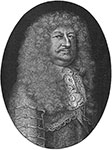Friedrich Wilhelm I.
|
 |
born Feb. 16, 1620, Cölln, near Berlin
died May 9, 1688, Potsdam, near Berlin
byname The Great Elector, German Der Grosse Kurfürst
Elector of Brandenburg (1640–88), who restored the Hohenzollern dominions after the devastations of the Thirty Years' War—centralizing the political administration, reorganizing the state finances, rebuilding towns and cities, developing a strong army, and acquiring clear sovereignty over ducal Prussia. All these measures contributed to the foundation of the future Prussian monarchy.
Frederick William was the eldest son of the elector George William and Elizabeth Charlotte of the Palatinate, a granddaughter of William the Silent, prince of Orange.
He grew up amid the chaos of the Thirty Years' War, in which Brandenburg suffered particularly heavily, and was forced to spend his childhood years far from the Berlin court in the fortress of Küstrin, where he was educated in the Calvinist faith. His stay in Holland between his 14th and 18th years, the time divided between the University of Leiden and the court of his future father-in-law, Frederick Henry of Orange, at The Hague, left him with lasting impressions. The future elector was, above all, impressed by Holland's imposing maritime and commercial power, as well as by its pioneering achievements in military technology and organization. He retained a marked preference for Dutch architecture and agriculture and a strong desire to open Brandenburg to international commerce and maritime trade.
Copyright © 1994-2002 Encyclopædia Britannica, Inc.
![]()
Sources
- Encylopedia Britannica 2002, Expanded Edition DVD
Web





